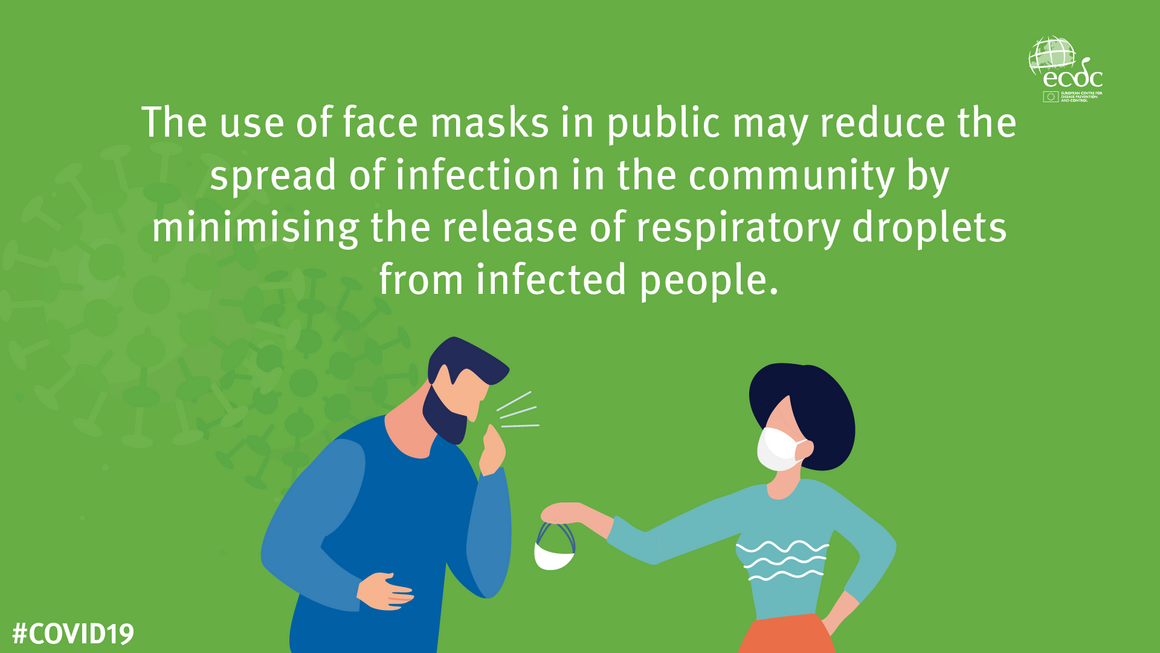How to protect yourself and others
This page contains general advice. Please follow national health authorities' detailed recommendations.
How to protect yourself
Get vaccinated
COVID-19 vaccines prevent you from getting COVID-19 by triggering an immune response.
Avoid touching your face
The virus can enter your body via your eyes, nose and/or mouth, so it is important to avoid touching your face with unwashed hands.
Wash your hands
Frequent washing of hands with soap and water for at least 20 seconds, or cleaning hands thoroughly with alcohol-based solutions, gels or tissues is recommended in all settings.
Stay away from infected persons
Avoid having close contacts with people infected with COVID-19.
Avoid social gatherings
Avoid physical meetings, events and other social gatherings in areas with ongoing community transmission, and follow local recommendations applicable to mass gatherings.
Use a face mask
Wear a face mask indoors and outdoors whenever physical distancing with other people cannot be guaranteed.
How to protect others

Get vaccinated
Vaccines protects vaccinated individuals and those around them who are vulnerable to COVID-19, reducing the risk of spreading the disease.
Use a face mask
If you are infected, the use of a medical face mask reduces the risk of you infecting other people.
If you are healthy, the use of a medical face mask when visiting busy, closed places reduces the spread of the infection in the community. Always follow local recommendations regarding the use of masks in public spaces.
Cough and sneeze etiquette
Cough or sneeze into your elbow or use a disposable tissue. If you use a tissue, dispose of it carefully after a single use and then wash your hands.
Stay at home if you are sick
If you feel unwell, stay at home. If you develop any symptoms suggestive of COVID-19, call your healthcare provider for advice immediately.
Keep physical distancing’
Physical distancing’ means physically staying apart from other people. Maintain social contact with friends, family and colleagues from a distance instead.
Self isolation
Self-isolate if you know you are infected with COVID-19, or if you have any symptoms of an acute respiratory infection like a cough, fever, sore throat or runny nose.
Travellers
If you are planning to travel, follow the local recommendations, and:
- Do not travel if you have the following symptoms: fever, cough, sore throat or other symptoms of COVID-19.
- Practice physical distancing at airports, railway stations, on trains, buses, etc.
- Wear a medical face mask to protect yourself and your fellow passengers at airports and railway stations, as well as during flights, on trains, buses, etc.
- If you feel ill while travelling, inform the crew and seek immediate medical advice, ideally by first telephoning your healthcare provider.
- When travelling, wash your hands with soap and water regularly, and/or use alcohol-based hand sanitisers; avoid touching your face with unwashed hands; and avoid contact with sick persons, especially if they have symptoms such as fever or a cough.
- If you have symptoms like a cough, fever, sore throat or similar within 14 days after returning home, seek immediate medical advice, ideally by first telephoning your healthcare provider.
It should be emphasised that older people and those with underlying health conditions should take these precautionary measures very seriously.
High-risk groups
If you belong to a high-risk group for COVID-19 (i.e. you are aged 60 years or older, or have an underlying health condition), in addition to the preventive measures above you should also consider:
- Avoid contact with sick people, particularly those with a cough;
- Avoid physical meetings, events and other social gatherings in areas with ongoing community transmission;
- Avoid crowds, especially in confined and poorly ventilated spaces;
- Shop for groceries at off-peak hours, or ask family, friends or volunteers for help with buying and delivering medication, food and other needs;
- Avoid using public transport during rush hours;
- Exercise outdoors instead of indoor settings;
- Rapidly seek medical care by telephone if you experience symptoms compatible with COVID-19.
Read more
Further reading
Questions and answers on COVID-19
Find more information on questions related to COVID-19 on infection, symptoms, guidelines, the situation, in the EU, vaccines, travel, and children.
Scientific and technical publications
Guidelines for the implementation of non-pharmaceutical interventions against COVID-19
These ECDC guidelines detail available options for NPI in various epidemiologic scenarios, assess the evidence for their effectiveness and address implementation issues, including potential barriers and facilitators.
Scientific and technical publications
Use of gloves in healthcare and non-healthcare settings in the context of the COVID 19 pandemic
This document aims to provide scientific evidence and guidance for healthcare settings and the public on using gloves as a preventive measure during the COVID-19 pandemic.



